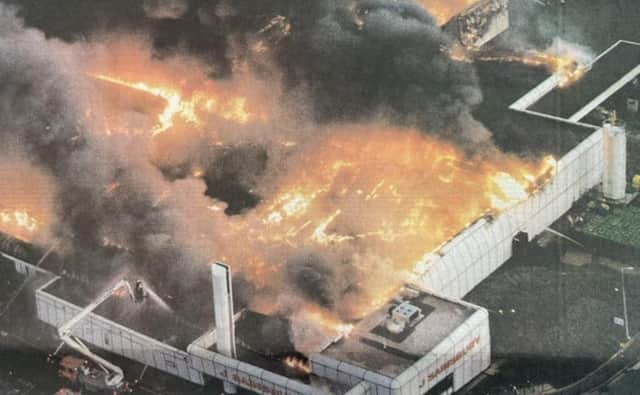30 years ago this week a massive fire destroyed Chichester's Sainsbury’s superstore


It’s impossible to believe that day is now 30 years ago, but the maths says it is. The point is that the day is indelibly etched in my memory. It’s years since I last covered hard news for our papers, but I remember still the adrenalin rush when our photographer burst into our quiet news room early afternoon on December 16 1993 and said “You’d better get down there. Sainsbury’s is on fire!”
We got there as soon as we possibly could and were spectators, nothing more, for the next six hours. Initially it was all a little bit underwhelming, with just a small plume of smoke from just one corner of the roof, but by then the building was well and truly alight under the roof. It meant that oddly it was a while before the seriousness of it all became apparent.
Advertisement
Hide AdAdvertisement
Hide AdSo we just waited and chatted with the firefighters as events unfolded. The fire had taken hold by 3pm, and as the winter darkness fell, so inevitably it became more dramatic. The numbers of fire engines and firefighters were multiplying all the time, so it seemed. At 6.42pm, it was announced that the fire was under control, but clearly that didn’t mean out. Far from it.
Records show that 25 fire engines brought 150 firemen. Shoppers, staff and passers-by stood in the car park, transfixed and shocked. It all looked so small to start with and yet in the end it destroyed the store – which is when the legal ramifications kicked off, the arguments, the claims, the endless debates over sprinklers (save the store versus damage its contents), the long road towards a total rebuild. By then, I must admit I had long since lost interest in it all. Others in the team covered the fall-out. But I was there on the night – and then back in the office to write it all up at break-neck speed.
The other great irony of the night was that this was a Thursday. The Chichester Observer had come out that morning. I can’t for the life of me remember how on earth it was conveyed to us standing in our car park, but if my memory is right, somehow it reached us that we were going to have a Friday edition of the paper to catch up with the news which had rendered the previous day’s paper utterly irrelevant – though I might be wrong.
But I can picture that paper – whether it was the next day or the following week. And there were eight or nine pages devoted to the blaze. I seem to recall that this was the beginning of the era where newspapers acknowledged the size of a news story in terms of page numbers. The bigger the story, the more pages it got. One page didn’t do it justice. We covered every angle and covered nine pages.
Advertisement
Hide AdAdvertisement
Hide AdSainsbury’s was widely praised. No one was hurt. The evacuation had been calm and efficient. But the blaze was estimated to have cost more than £10 million worth of damage. Some even suggested it was God’s punishment for Sunday trading…
But looking back, I think above all, the whole thing makes me realise just what a different world we were living in back then. As L P Hartley so famously wrote: “The past is a foreign country; they do things differently there.” You can say that again.
For a start, as I said, we just stood there as reporters and did nothing once we had got a few eyewitness accounts in our notebooks. The fact is that there was absolutely nothing we could do with what we had at that stage. Amazing to think that there was no internet, there was no Facebook, there was no Twitter, there were no mobile phones; there was no video to be shot. We were utterly unconnected as we stood there. Blimey, who would have thought that you could walk out of the room with a telephone, and without a cable? And then take video on it? Whatever next?
But just think how it would be now. We would be filing rolling stories on our websites; we would be uploading endless pictures, endless videos; we would be putting them on Facebook; we would be Tweeting (or is it X’ing?) them. There would be huge pressure to provide continuous real-time coverage through all the various platforms that connect us every second of the day with absolutely everywhere in the world. Back then, it was just us, hundreds of firefighters and a massive blaze.
Advertisement
Hide AdAdvertisement
Hide AdAnd think too of the way we shop. Remember these were the days before electronic banking. We were barely more than a week before Christmas. Hundreds of shoppers were in the store stocking up at the time of the blaze. But thousands more had been in the store that day, and just think how many of them would have paid by cheque – a cheque which then untraceably went up in smoke. Sainsbury’s didn’t just lose their store that day. They funded the entirety of Christmas for scores and scores of families across the district.
But maybe the thing that signals most the fire’s distance in time was that we instantly called it “one of Chichester’s biggest post-war blazes.” Just think about it. This was so long ago that the war was still our point of reference. Do we still talk about things being post-war now? I don’t think so. Presumably that ceased when the new millennium dawned. Yes, the past is indeed a foreign country.